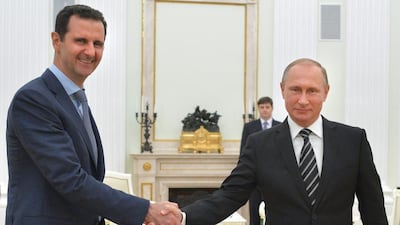One thing that was clear early on when Russia intervened militarily in Syria was that President Vladimir Putin saw his campaign as part of a broader effort to push a political plan for a resolution of the war.
Indeed, to facilitate such a plan in the period leading up to Russian involvement, Moscow opened lines of communication to all the major parties in Syria, including Saudi Arabia. This led many people to mistakenly assume that Mr Putin was preparing to dump Syrian president Bashar Al Assad.
That illusion was strongly dispelled last week when Mr Al Assad was invited to the Kremlin, his first trip abroad for years. Nor, when Russian foreign minister Sergei Lavrov met his American, Saudi and Turkish counterparts, John Kerry, Adel Al Jubeir and Feridun Sinirioglu, in Vienna on Friday, were there any signs that Russia was prepared to consider giving up on Mr Al Assad.
Diplomatic contacts are intensifying. This Friday the four foreign ministers will again meet in Vienna, and Mr Kerry and Mr Lavrov have already spoken three times about Syria this week. While on Monday Oman, which never cut its ties with Damascus, sent its foreign minister, Yusif ben Alawi, to meet Mr Al Assad, only days after he met Syrian opposition leader Khaled Khoja.
Much attention was directed at a statement from Mr Lavrov in which he said Russia was prepared to use its air power to support the Free Syrian Army in its fight against ISIL. The offer took many by surprise, but only echoed a long-standing Russian position that the Syrian regime and its “moderate” foes would do best to unite against jihadi groups, above all ISIL and Jabhat Al Nusra, the Al Qaeda affiliate.
According to Arab media reports, one reason Mr Al Assad was invited to Moscow was to clear this proposal with him. Beyond that, the Russians would like to integrate the moderate rebels into negotiations with the regime and Syria’s political process, in that way dividing Mr Al Assad’s enemies.
In light of this, Mr Lavrov has said Russia backs parliamentary and presidential elections in Syria. Mr Al Assad, perhaps not wanting to be pushed in directions he does not control, offered a caveat. He said on Sunday that he would only hold presidential elections after what he referred to as the “terrorists” were defeated – in other words, when he would have no incentive to make concessions.
The Russians, despite their military deployment in Syria, face a number of serious obstacles to a political deal. The first of these is Mr Al Assad himself. While the Syrian president has displayed no anxiety that Russia will put in place a mechanism to ultimately remove him from office, he can never be too sure, given that he is the principal obstacle to a political solution.
Mr Putin must also contend with Iran, which has been heavily involved in the war in Syria, and will probably foot the bill for its continuation. The Russians realise any political deal in Syria must be agreed beforehand with Tehran, which is why the Iranians will be at the talks.
In trying to strike a decisive blow in Syria, Russia galvanised its rivals and unified their efforts. The Americans and Saudis have already agreed to provide the Syrian opposition with more weapons, including the highly effective TOW anti-tank system. And the Americans, Saudis and Turks strongly reject any notion that Mr Al Assad remain in power after a transitional phase.
As the Russians search for a way out of this labyrinth of conditions, their options are limited. Either they and their allies must shift the military balance in their favour, or failing to do so will gradually have to show greater flexibility. The first alternative is far from certain, given the size and weaponry of the opposition in the Hama, Idlib, Aleppo area. More probable is a stalemate that will prolong the fighting, forcing all sides to recalculate.
Perhaps that explains Russia's latest diplomatic manoeuvres. Mr Putin understands that the longer the Russians are entangled in Syria with no political endgame in sight, the weaker his position will become. If he can get negotiations moving and build a consensus around a solution, the better are his chances of reaching a settlement to end the war.
Mr Al Assad must not be terribly reassured. He’s the weak link in all arrangements, and has spent more than four years trying, and failing, to overcome his enemies. He cannot be overly confident in a Russian military victory. The president must also worry that the military dynamics will determine his political future.
The real dilemma is that Mr Al Assad does not allow Russia to advance the key political facet of its Syrian project. With him no settlement seems remotely possible. Sending in aircraft and firing missiles from the Caspian Sea is easy. Salvaging a mass murderer against a majority of his society is far more difficult.
Unless Russia and Iran can shift things on the ground, the optics of recent weeks will wear off. That’s why all sides are mainly engaged in diplomatic probing, in anticipation of the battles to come. Syria is becoming a test of Russian hubris.
Michael Young is opinion editor of The Daily Star in Beirut
On Twitter: @BeirutCalling


